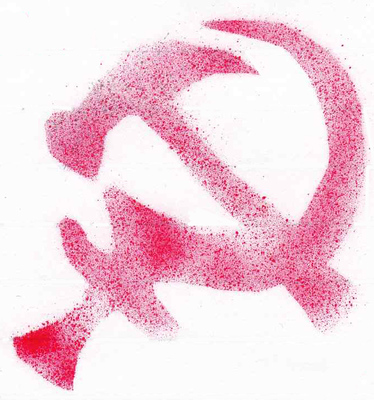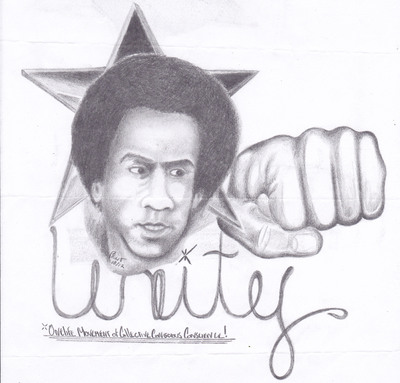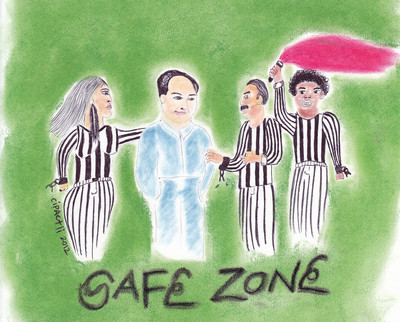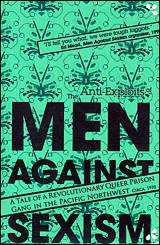
ULK30: Consolidating Forces for a New Year
Consolidating our forces becomes an important task when we must prepare for a struggle. Right now in California prisoners are gearing up for a second round of struggle against the SHU and related issues prisoners face there. Since 2011, USW leaders have been doing what they can to consolidate the prisoner rights movement there, under torturous conditions of isolation and targeted censorship and repression.
Recently it was brought to our attention that Michael Novick of Anti-Racist Action addressed MIM in an issue of Turning the Tide focused on a consolidation around a new group in alliance with the Black Riders Liberation Party. Drawing out our line differences is part of consolidating progressive forces around one line or another. Before getting to that, let me address an effort to consolidate our support base for Under Lock & Key.
Become a ULK Sustainer
Having passed our five year anniversary of publishing Under Lock & Key we recognize the importance of revolutionary institutions that are reliable and sustainable. In those five years we have never missed a deadline, and ULK currently comes out like clockwork every 2 months, representing the voice of the anti-imperialist movement in U.$. prisons. A small minority of you have been right there with us providing regular reports, articles, poetry, art and finances for Under Lock & Key. Without your support we could not be that voice.
While we have a writers group, a poetry group and an artist group that prisoners can join to become regular contributors, we have not had a funders group. Well, that has changed. And we encourage all readers who think ULK is important to join the funders group. As we all know, prisoners are a unique group of people in this country who sometimes don’t have access to any money. But everyone should be able to find a way to contribute to Under Lock & Key, and sending regular funds is one way to do so. Like our other groups, those who are regular contributors will get priority for free books and other support.
Here’s how the funder group will work. To join, write to us and make your pledge, and whether you will pay it in stamps or in checks. A pledge should be the amount you will contribute to each issue of ULK, which comes out every 2 months. It costs us approximately $1 to get each prisoner a copy of ULK. Therefore to just cover your own issue you should pledge $1 per issue or $0.50 per month.
So when should you send your donation in? For those who pay in stamps you can send them in any time that works for you, but at least once every 2 months to be an active sustainer. For those who pay by check or money order, please remember that WE CANNOT ACCEPT CHECKS MADE OUT TO MIM. We will send you information on how to donate once you pledge. If you have the option, send stamps as they can be applied most directly to our work. Of course, outside supporters can also become financial sustainers. Email mimprisons@lavabit.com to make your pledge.
We will record what you pay and track whether we meet our pledge goals for 2013. We’ll also be able to see whether we can increase our pledges over the years to come, which we will include in our annual reports that come out each summer.
Battle for Humyn Rights in California Regrouping
Cipactli gives us a breakdown of the latest in the battle for humyn rights in California prisons on in h article in this issue. Leading up to July 8, 2013, the call was made for comrades in different sectors of the California prison system to draft up their own list of demands. MIM(Prisons) has been working with the USW California Council to develop a list of demands that embody what we feel are minimal requirements to meet basic humyn rights for prisoners in California. Fundamental to that is abolishing the use of long-term isolation as well as punishment of people for their national, cultural and political associations.
As one comrade in SHU wrote,
Although I support the original five demands and will continue to do so along with any future demands for justice. I felt the need to add to the dialogue… What I noticed from the five demands and many other proposals being kicked around is the absence of the very core of our oppression - the SHU itself. What we have learned since the initial strike was that many civil rights groups and people around the world see the SHU itself as torture. All or most of what is being asked for i.e. contact visits, phone calls, cellies etc. can be granted were it not for SHU. Even things like validation and debriefing become easier to combat when the SHU is out of the picture. So it is the SHU itself that becomes the kernel of our oppression in regards to the prison movement in general and the current struggle we are facing in Pelican Bay. This is why any proposals should have at the forefront the demand to close the SHUs!
And another,
We can’t afford for prisoners to sacrifice their lives [on a path that lacks philosophical/scientific understanding]. We’re pursuing what is essentially a tactical issue of reforming the validation process as if it were a strategic resolution to abolishing social-extermination of indefinite isolation. This is not a complex issue to understand, and it requires a minimal amount of study at most to understand that the validation process is secondary and is a policy external to the existence of the isolation facilities. It’s not difficult to comprehend that external influences create the conditions for change but real qualitative change comes from within, and to render the validation process, program failure, the new step down program, etc., obsolete, and end indefinite isolation, requires an internal transformation of the isolation facilities (SHU and Ad-Seg) themselves. Otherwise, in practice, social extermination retains continuity under a new external label.
For decades now, MIM, and now MIM(Prisons), and many other groups have agitated around a campaign to Shut Down the Control Units in the U.$. As forces regroup around this struggle in California following the intense struggles in 2011, we are working to consolidate around a clear position on these issues for those who are in alliance with the movements for national liberation and against imperialism, and not interested in just playing games of back and forth with the various Departments of Corrections.
The broader group of USW comrades in California will have a chance to review and comment on the our draft list of demands soon. Once finalized, we will be enlisting you to promote and agitate around these demands.
Ideological Struggle
We didn’t have time or space to address Novick in full here. But many of you have seen his article in the latest Turning the Tide, so we want to address it briefly. First let’s make some factual corrections. 1) MIM Thought has always put youth as the progressive force in the gender contradiction in the imperialist countries, not wimmin. 2) While exploitation does only occur at the point of commodity production according to Marx, MIM Thought draws lines of class primarily along access to wealth not what sector one works in. Novick’s statement is confusing the explanation that certain nations must be exploiters to be dominated by service workers with our definition of the proletariat. 3) Later he accuses MIM of supporting neo-colonialism in South Africa, when ironically, MIM was on the front line of the movement in the U.$. in the 1980s supporting the revolutionary forces in South Africa that opposed the neo-colonial solution. He does so to take a stab at Mao’s United Front theory.
As to the line offered in that article, we are proven correct in drawing a parallel between Novick and the RCP=U$A line on class and nation in a critique written by the Black Order Revolutionary Organization in 2011. Comrades can read the commentary on the murder of Sunando Sen in this issue, and our recent review of Bromma’s Exodus and Reconstruction (which has not been published in ULK) to get our line on nation in a neo-colonial world. Novick’s position is presented as the line of inter-communalism “in an era when the nation-state… has become obsolete.” MIM(Prisons) has long been skeptical of inter-communalism (originally proposed by Huey P. Newton in the early 1970s). This presentation by Novick shows how “inter-communalist” ideology can lead to class collaborationism by ignoring the principal contradiction between oppressor nations and exploited nations. We expect to address these issues more in the future.
In this issue, the broader topic of ideological struggle as part of consolidating our forces is expanded on in Ehecatl’s article on the importance of study in this stage as the movement is beginning to grow.
As editor, I lament the lack of international news in this issue of ULK. But we did not want another one to go by without printing our review of Zak Cope’s new book on the labor aristocracy. This review does provide us with an outline of a theoretical framework for understanding global imperialism. It is also relevant to this issue of ULK in that it directly addresses the question of consolidating our forces ideologically, with what is the most important dividing line question of our time and place.
While we still struggle to push the MIM line on the labor aristocracy, MIM(Prisons) is going deeper to look at the oppressed nations in the United $tates to have a better analysis for our work. Soso’s article on affirmative action is a piece of our developing line on this analysis that we will be releasing for peer review next month, and to the public in the not too distant future.
MIM(Prisons) is also delving into a new project this month that we hope will expand our abilities to promote education and theoretical development among the prison masses. And this is the heart of our consolidation work. Consolidate means to bring together, but it also means to discard the unwanted as well as to strengthen. We like this word because it embodies the Maoist principles of one divides into two as well as unity-struggle-unity. In both cases we advance by pushing political struggle forward, rather than being Liberal in an attempt to preserve unity. Even at the level of the United Front, where unity is less tight than at the level of the cadre organization, we must hold to certain principles for the United Front to be meaningful and strong.
Related Articles:
- Response to People Against Racist Terror
- Affirmative Action Battle Fails Oppressed Nation Youth
- Visitation cut off at Salinas Valley State Prison
- New Must-Read on the Labor Aristocracy
- Maintaining Our Strategical Advantage: Study Maoism Seriously
- Separating the Strands: Comments on Bromma's "Exodus and Reconstruction"












